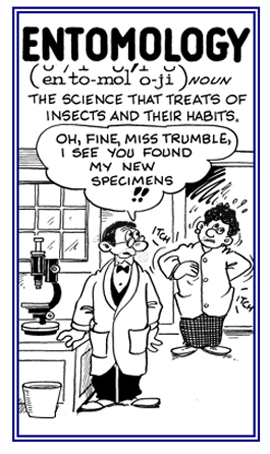2. Etymology: from French entomologie (1764), coined from Greek entomon, "insect" + logia, "study of".
Entomon is the neuter form of entomos, "having a notch or cut (at the waist)"; so called by Aristotle in reference to the segmented division of insect bodies.
Scientists who study insects (there are close to a million that can be studied) are called entomologists. Then why aren't they called "insectologists"? Well, they are.
The word insect comes from the Latin word insectum, meaning "cut up" or "divided into segments".
The plural of insectum, namely insecta, is used by scientists as the name of the taxonomic class that insects belong to.
This Latin word was created in order to translate the Greek word for "insect", which is entomon and literally means "cut up" or "divided into segments", and it is the source of the word entomology.
The Greeks coined this term for insects because of the division of insect bodies into three segments, now called the head, thorax, and abdomen.

Go to this Word A Day Revisited Index
so you can see more of Mickey Bach's cartoons.
Etymology makes it possible to better understand the origins and meanings of words.
It is important to have an understanding of etymology in order to understand the naming of insects during one's study of entomology.
An etymologist is someone who knows the difference between etymology and entomology.
Medicolegal forensic entomology includes arthropod involvement (mostly necrophagous or corpse-eating) involving events such as murder, suicide and rape, but also includes physical abuse and contraband trafficking.
In murder investigations, it is concerned with where and when insects lay eggs; and in what order they appear in dead bodies. This can be helpful in determining the time or post mortem interval and location of the death being investigated.
V.A. Little, Professor Emeritus of Entomology; Texas A&M University; Harper & Row, Publishers; New York; 1972.
- An Introduction to the Study of Insects by Donald J. Borror and Dwight M. DeLong; Holt, Rinehart and Winston; New York; 1964.
- General and Applied Entomology by V.A. Little; Harper & Row, Publishers; New York; 1957.
- Insects of the World by Anthony Wootton; Blandford Press Ltd.; New York; 1984.
- Spiders of the World by Rod & Ken Preston-Mafham; Facts on File Publications; New York; 1984.
- The Ant Realm by Ross F. Hutchins; Dodd, Mead & Company; New York; 1967.
- The Ants by Bert Holldobler and Edward O. Wilson; The Belknap Press of Harvard University Press; Cambridge, Massachusetts; 1990.
